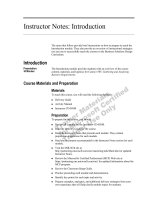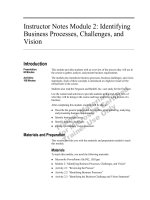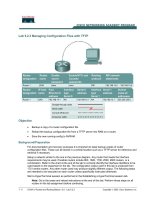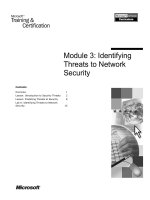Tài liệu Instructor Notes Module 3: Services-Based Approach to Solution Design pptx
Bạn đang xem bản rút gọn của tài liệu. Xem và tải ngay bản đầy đủ của tài liệu tại đây (86.1 KB, 4 trang )
Instructor Notes Module 3: Services-
Based Approach to Solution Design
Introduction
This module teaches students about the services-based design approach and the
differences between user services, business services, and data services. This
approach is captured in the Microsoft
®
Solutions Framework (MSF)
Application Model.
After completing this module, students will be able to:
!
Describe the principles behind the MSF Application Model.
!
Identify the service layers of the MSF Application Model.
!
Explain the value of the MSF Application Model in designing solutions.
Materials and Preparation
This section provides you with the materials and preparation needed to teach
this module.
Materials
To teach this module, you need the following materials:
!
Microsoft PowerPoint
®
file P03_1608a.ppt
!
Module 3, “Services-Based Approach to Solution Design”
!
Activity 3.1, “Identifying Services”
Preparation
To prepare for this module, you should:
!
Read all the materials for this module.
!
Complete the activity.
!
Understand the MSF Application Model.
Presentation:
50 Minutes
Activity:
25 Minutes
2 Instructor Notes Module 3: Services-Based Approach to Solution Design
Activities
Activity 3.1: Identifying Services
In this activity, students will identify the layers in the scenario provided.
After completing this activity, students will be able to:
!
Demonstrate an understanding of user interface, user services, business
services, data services, and data store.
!
To prepare for the activity
1. Complete the activity yourself.
As you work through the activity, consider alternative solutions that
students may present so that you will be prepared for those solutions as
well.
2. Review the suggested solution.
This activity will help students understand the distinction among the layers of a
design. Students who are not familiar with n-tier applications or services-based
design might be confused by the concept of layers. Use this activity to help
students understand this concept.
Instructor Notes Module 3: Services-Based Approach to Solution Design 3
Module Strategy
Use the following strategy to present this module:
!
Services-Based Approach
In this section, students learn about application models and are introduced to
the MSF Application Model. Be certain to emphasize that the three service
layers are logical, not physical, and do not necessarily imply three physical
boxes or tiers. You might want to develop a simple example involving an
application running entirely on one computer to emphasize this point.
This course uses the term “layer” to refer to the logical constructs of
user interface, user services, business services, data services, and data store.
The term “tier” is used in the sense of a physical distribution of components
across a topology, as in “an n-tier application.”
!
Activity 3.1: Identifying Services
Be sure to foster discussion and reach a class consensus on the answer. It is
crucial that students understand the concepts being presented. This is
another part of the foundation of the remainder of the course.
!
Value of a Services-Based Approach
The fundamental point of this section is contained in the lead-in to the
opening slide: “Traditionally, multiple solutions meant multiple
implementations of similar logic. With the services-based approach,
application logic can be shared, thus ensuring logical consistency and saving
development time.”
Your goal for this section is to be sure that students grasp this point. Some
of the students, particularly those who have never used a services-based or
multiple layer approach to design, may feel that breaking the application
into multiple service layers is a waste of time. Be prepared with examples
showing the value to an organization of making a commitment to a services-
based approach to solution design.
Note
THIS PAGE INTENTIONALLY LEFT BLANK









